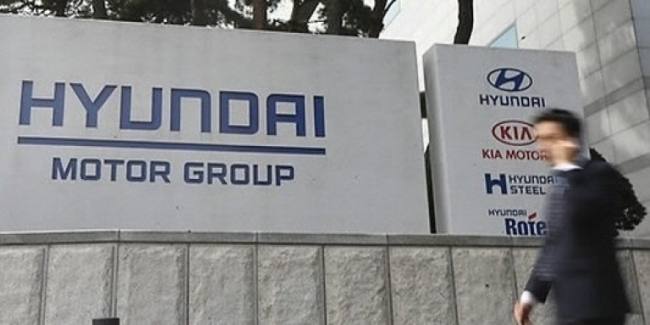Hyundai, Kia‘s regional reps in Seoul for biannual meeting
By Kim Bo-gyungPublished : July 17, 2018 - 18:57
Hyundai and Kia Motors, South Korea’s top two automotive companies, will hold their biannual meeting this week with representatives of regional headquarters and overseas branches to discuss the issue regarding a possible US car tariff, alongside ways to bolster sales in the second half of the year, the companies said Tuesday.
This week’s meeting is the first since the auto giants established regional headquarters in the US, Europe and India last month as part of Hyundai Motor Group’s strategy to adopt management suitable for each region.
Hyundai Vice Chairman Chung Eui-sun led the meeting last year, but there is a high possibility that Hyundai Motor President and CEO Lee Won-hee will lead this year’s meeting, the company said.
Kia Motors’ meeting will most likely be led by Kia Motors CEO Park Han-woo.
“At the meeting, the US car tariff issue will be at the top of the agenda. It has not been confirmed if Vice Chairman Chung will be present,” said the spokesperson of Hyundai Motor Group.
The US Department of Commerce is scheduled to hold a public hearing on Section 232 of the Trade Expansion Act of 1962 this week, based on which the US President Donald Trump is pushing to slap a 25 percent tariff on imported cars.
Seeking to persuade the US government that vehicles shipped from Korea do not pose national security threats, Hyundai Motor President Chung Jin-haeng is currently visiting the US together with a delegation headed by Trade Minister Kim Hyun-chong.
This week’s meeting is the first since the auto giants established regional headquarters in the US, Europe and India last month as part of Hyundai Motor Group’s strategy to adopt management suitable for each region.
Hyundai Vice Chairman Chung Eui-sun led the meeting last year, but there is a high possibility that Hyundai Motor President and CEO Lee Won-hee will lead this year’s meeting, the company said.
Kia Motors’ meeting will most likely be led by Kia Motors CEO Park Han-woo.
“At the meeting, the US car tariff issue will be at the top of the agenda. It has not been confirmed if Vice Chairman Chung will be present,” said the spokesperson of Hyundai Motor Group.
The US Department of Commerce is scheduled to hold a public hearing on Section 232 of the Trade Expansion Act of 1962 this week, based on which the US President Donald Trump is pushing to slap a 25 percent tariff on imported cars.
Seeking to persuade the US government that vehicles shipped from Korea do not pose national security threats, Hyundai Motor President Chung Jin-haeng is currently visiting the US together with a delegation headed by Trade Minister Kim Hyun-chong.

Due to sluggish demand in the US, Hyundai and Kia sold a combined 642,096 units there between this January and June, down 2.1 percent on-year, the company said.
Hyundai saw a 3.3 percent drop in the number of vehicles sold in the cited period.
As for the luxury car segment, Hyundai’s high-end brand Genesis is slated to launch the G70 sedan next month.
Despite China-exclusive models released there, Hyundai has yet to recover demand in China, where it sold 380,098 units in the first half of this year.
This is 26 percent more than the year when it was hit by China’s economic retaliation over the deployment of the Terminal High Altitude Area Defense system, but is far lower than the 523,000 units and 510,229 units it sold in the first half of 2016 and 2015, respectively.
By Kim Bo-gyung (lisakim425@heraldcorp.com)







![[Graphic News] More Koreans say they plan long-distance trips this year](http://res.heraldm.com/phpwas/restmb_idxmake.php?idx=644&simg=/content/image/2024/04/17/20240417050828_0.gif&u=)
![[KH Explains] Hyundai's full hybrid edge to pay off amid slow transition to pure EVs](http://res.heraldm.com/phpwas/restmb_idxmake.php?idx=644&simg=/content/image/2024/04/18/20240418050645_0.jpg&u=20240419100350)





![[From the Scene] Monks, Buddhists hail return of remains of Buddhas](http://res.heraldm.com/phpwas/restmb_idxmake.php?idx=652&simg=/content/image/2024/04/19/20240419050617_0.jpg&u=20240419175937)

![[KH Explains] Hyundai's full hybrid edge to pay off amid slow transition to pure EVs](http://res.heraldm.com/phpwas/restmb_idxmake.php?idx=652&simg=/content/image/2024/04/18/20240418050645_0.jpg&u=20240419100350)

![[Today’s K-pop] Illit drops debut single remix](http://res.heraldm.com/phpwas/restmb_idxmake.php?idx=642&simg=/content/image/2024/04/19/20240419050612_0.jpg&u=)